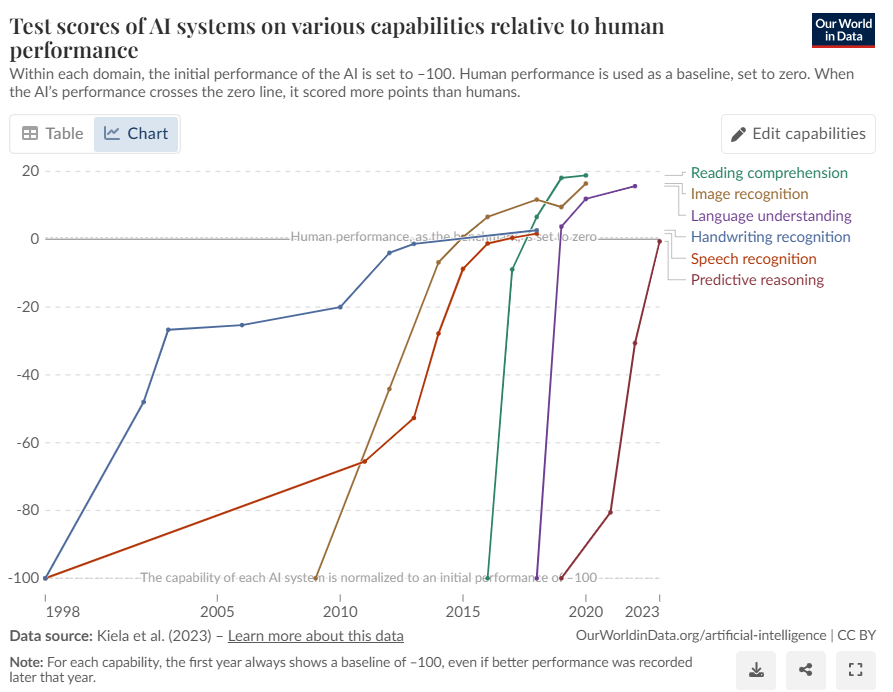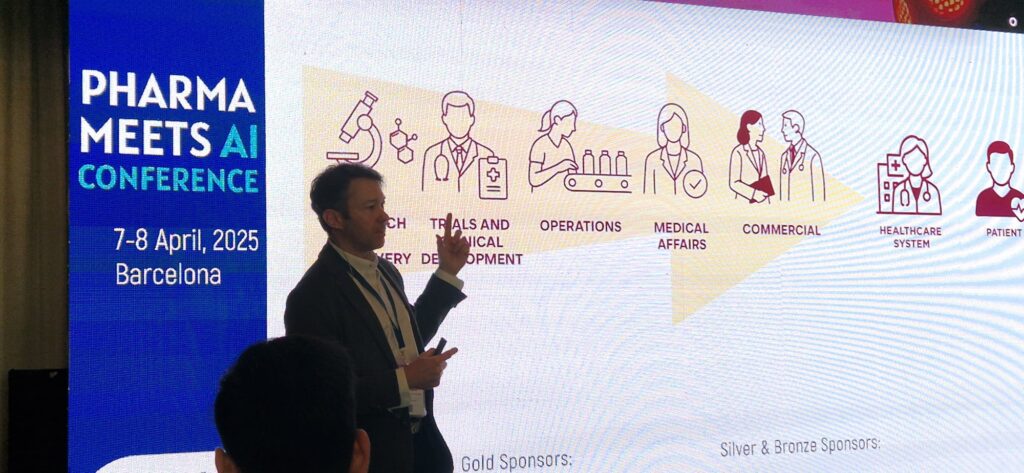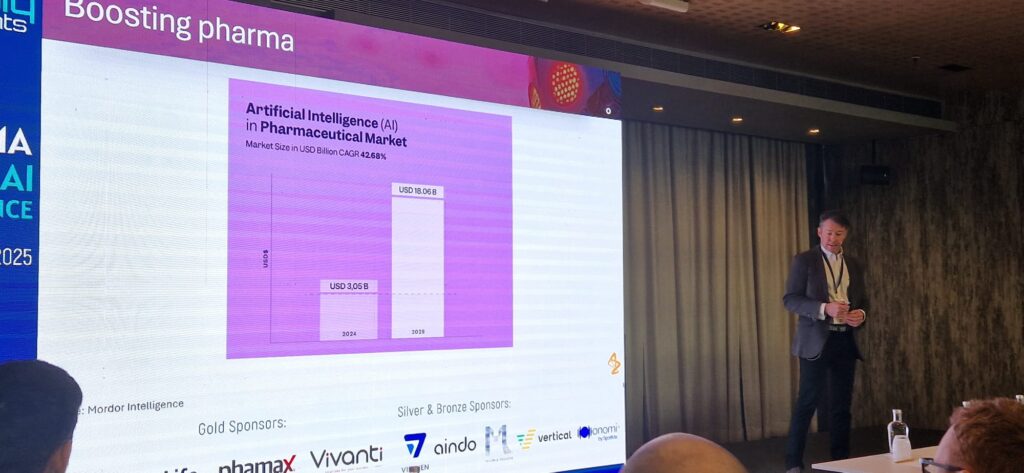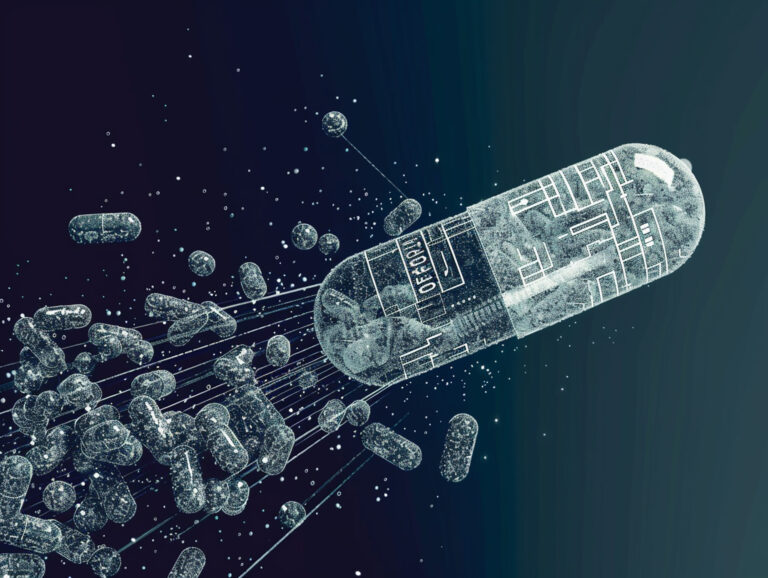The AI transformation in pharma
Artificial intelligence (AI) is revolutionising the pharmaceutical industry in unprecedented ways. From accelerating drug discovery to enhancing molecular design and predicting drug safety profiles, AI technology is significantly reducing the time required to bring new medicines from the laboratory to market.
At the ‘Pharma meets AI’ Ubiq event in Barcelona this April, Antonio Velasco, Chief Information Officer (CIO) at AstraZeneca, shared groundbreaking insights into how AI is reshaping pharmaceutical research and development. With exponential investment growth and rapid technological advancement, AI capabilities are quickly approaching—and in some areas surpassing—human performance levels.
This comprehensive guide explores how AI is transforming every aspect of pharmaceutical operations. AI impacts everything from research and development to patient care, and enhances digital content creation capabilities for customer engagements. Read further to learn about the tremendous opportunities this presents for the industry’s future.
[For additional insights on AI’s growth trajectory, explore more here]
DeepBlue’s legacy in pharma AI
The Kasparov vs. DeepBlue moment (1997)
In May 1997, IBM’s DeepBlue computer achieved a historic victory against world chess champion Garry Kasparov. This watershed moment demonstrated that machines could outperform humans in complex strategic tasks, marking a pivotal turning point for artificial intelligence development.
Today, the pharmaceutical industry is experiencing its own “DeepBlue moment.” AI systems are consistently surpassing human capabilities in critical areas such as:
- Drug discovery and molecular design
- Massive dataset analysis
- Drug efficacy prediction
- Clinical trial optimisation
Similar to how DeepBlue revolutionised chess strategy, AI is fundamentally transforming pharmaceutical research methodologies, drug development processes, and market delivery timelines.
Beyond generative models
The AI Spectrum in Pharmaceuticals
Whilst generative AI (systems that create content like text, images, or music) has captured significant media attention, the pharmaceutical industry leverages a much broader range of AI technologies.

According to the Gartner Hype Cycle, AI technologies progress through distinct stages:
1. Innovation trigger
2. Peak of inflated expectations
3. Trough of disillusionment
4. Slope of enlightenment
5. Plateau of productivity
Currently, generative AI occupies the peak of the hype cycle, but many established AI technologies have already reached productivity plateau status, delivering tangible value across the pharmaceutical sector:
Machine learning – Predictive modelling for drug interactions
Natural language processing (NLP) – Medical literature analysis and reporting
Computer vision – Medical imaging and diagnostic applications
Robotic process automation (RPA) – Laboratory automation and data processing

Medical Affairs Transformation
The transformation of Medical Affairs through AI represents a pivotal shift from traditional support functions to strategic value creation. By leveraging advanced AI technologies, Medical Affairs teams are now equipped to generate profound customer insights and deliver more meaningful engagements with healthcare professionals.
The impact is substantial: organisations are experiencing a 25% reduction in
communication costs whilst significantly enhancing the speed and precision of their interactions. AI-powered automation has revolutionised literature review processes, enabling Medical Affairs professionals to access and analyse scientific data in real-time.
This technological advancement facilitates richer, more informed exchanges with healthcare practitioners and accelerates the dissemination of critical medical information. The result is not merely operational efficiency but a fundamental elevation of Medical Affairs’ role in driving scientific dialogue and patient care advancement. With an expected annual value of £2.2 billion, this transformation positions Medical Affairs as a core strategic driver in the pharmaceutical value chain.

Investment landscape for the pharmaceutical industry’s AI commitment
According to McKinsey’s 2024 research, AI adoption across the pharmaceutical value chain is projected to generate over £39 billion annually, creating efficiencies across the entire production lifecycle.
Research & development revolution
- 30% increase in viable drug candidates
- 2.5x performance improvement with 4x faster insights
- 10% higher success probability
- 20% cost reduction
- Expected annual value: £11 billion
Clinical trials & development
- 20% cost reduction in trial execution
- 15% faster patient enrolment
- 30% savings in documentation management
- 50% quicker database locking
- Expected annual value: £9.5 billion
Manufacturing optimisation
- 10% reduction in procurement costs
- 10% improvement in Overall Equipment Effectiveness (OEE)
- 35% productivity increase in quality control
- Expected annual value: £3 billion
Commercial operations
- 40% cost reduction in personalised engagement
- 50% faster approval processes
- 10% productivity improvement in field operations
- Expected annual value: £13 billion

AI performance evolution, from 1998 to Present
The progression of AI capabilities since 1998 reveals remarkable advancement across multiple disciplines:

Reading comprehension
1998: Significant deficit (-100 relative to human baseline)
Today: Superior processing of complex medical literature and research papers
Image recognition
2015: Surpassed human capabilities
Today: Essential for diagnostic imaging and pattern recognition in pharmaceutical research
Language understanding
2018: Achieved human parity
Today: Powers advanced chatbots and medical diagnostic assistants
Handwriting recognition
2015: Exceeded human performance
Today: Digitises medical records and prescriptions accurately


Speech recognition
2015: Outperformed human capabilities
Today: Enables medical transcription and doctor-patient conversation analysis
Predictive reasoning
2020: Reached human parity
Today: Forecasts disease outbreaks and drug effectiveness

AI's expanding role in pharmaceuticals
The pharmaceutical industry’s embrace of AI technology represents more than experimental implementation—it’s a fundamental strategic shift. As AI capabilities continue to evolve, we can expect:
- Accelerated drug discovery pipelines
- Personalised medicine becoming standard practice
- Enhanced patient safety through predictive analytics
- More efficient clinical trial processes
- Optimised supply chain management
Artificial intelligence is not merely changing pharmaceutical operations—it’s redefining the industry’s entire approach to healthcare innovation. From laboratory research to patient care delivery, AI’s impact continues to expand, promising faster development cycles, reduced costs, and ultimately, better patient outcomes.
As demonstrated at the Ubiq event, industry leaders like AstraZeneca are leading this transformation, proving that AI’s potential in pharmaceuticals extends far beyond theoretical applications—it’s creating tangible value today whilst shaping tomorrow’s medical breakthroughs.
This article was inspired by insights shared at the ‘Pharma meets AI’ Ubiq event in Barcelona, featuring Antonio Velasco, CIO at AstraZeneca.

